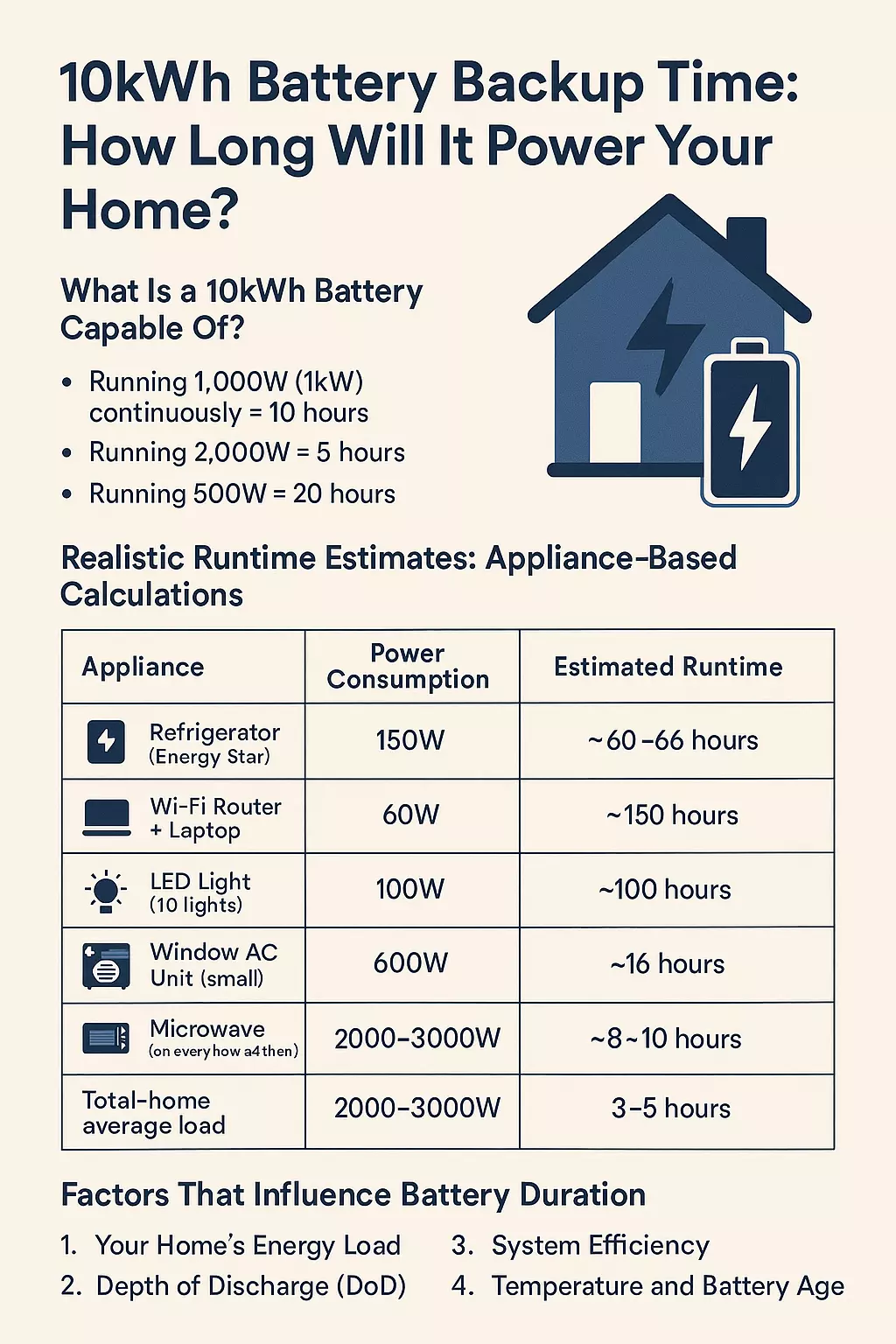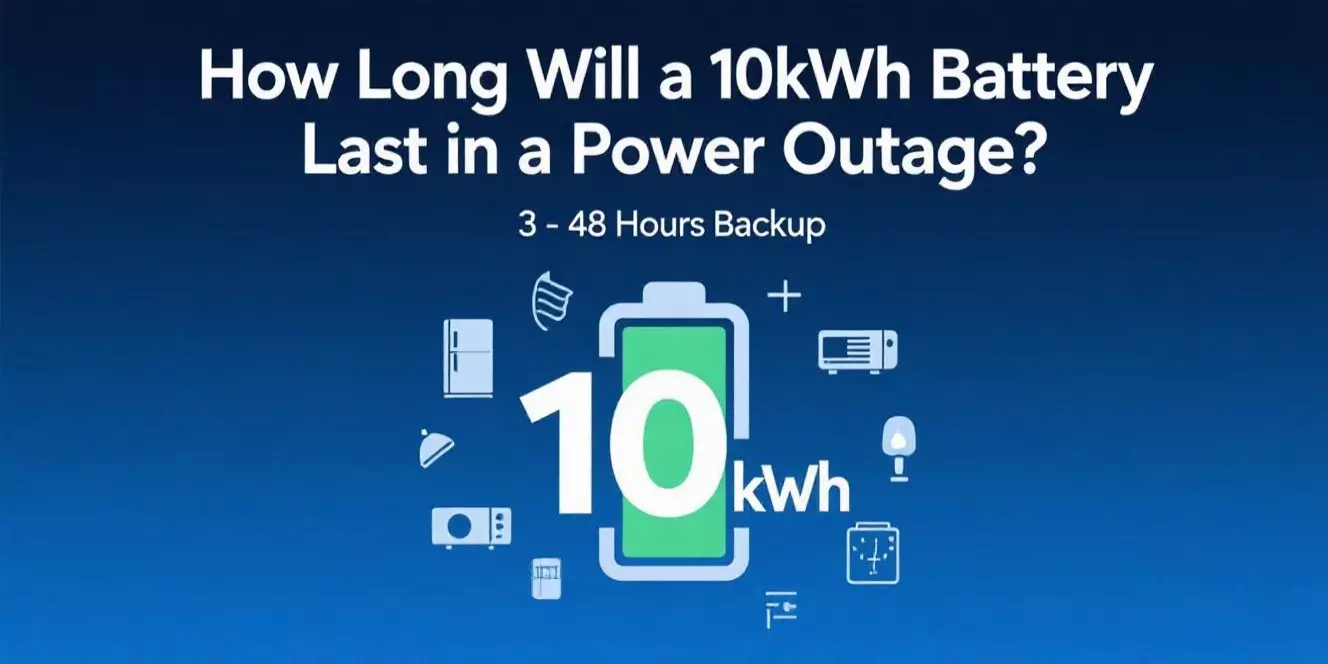Power outages can ruin a day, but with the right-sized home battery backup system, essential appliances can keep running. Perhaps the most desirable storage solution is a 10kWh battery, an all-around solution—but how long will it keep running once the grid fails?
In this article, we’ll break down the variables that affect battery backup time, examine real usage cases, and offer strategies to make the most out of a 10kWh battery during an outage.

What Is a 10kWh Battery Capable Of?
A 10kWh (kilowatt-hour) battery stores 10,000 watt-hours of energy. In theory, that means:
- Running 1,000W (1kW) continuously = 10 hours
- Running 2,000W = 5 hours
- Running 500W = 20 hours
But actual runtime is also influenced by several factors, including:
- The actual devices being driven
- Inverter and battery system efficiency
- Depth of discharge (DoD)
- External environment and system age
Realistic Runtime Estimates: Appliance-Based Calculations
This is a brief look at common household appliances and how long a 10kWh battery might power them:
| Appliance | Power Consumption | Estimated Runtime |
|---|---|---|
| Refrigerator (Energy Star) | 150W | ~60–66 hours |
| Wi-Fi Router + Laptop | 60W | ~150 hours |
| LED Light (10 lights) | 100W | ~100 hours |
| Window AC Unit (small) | 600W | ~16 hours |
| Microwave (occasional use) | 1000W | ~8–10 hours |
| Total-home average load | 2000–3000W | ~3–5 hours |
Hint: Using only essential loads like refrigeration, lights, and communications can stretch backup time to over 24 hours.
Factors That Influence Battery Duration
- Your Home's Energy Load: A home drawing 3kW will drain the battery in ~3 hours; at 1kW, it can last over 10 hours.
- System Efficiency: Losses reduce usable energy to ~90–95%, effectively ~9kWh usable capacity.
- Depth of Discharge (DoD): LiFePO₄ batteries allow 80–90% DoD, older lead-acid batteries only ~50%.
- Temperature & Battery Age: Extreme conditions and aging degrade capacity over time.

Real-World Usage Scenarios
- Low Demand (Critical Loads): 220W total – Runtime: ~40–45 hours
- Moderate Demand: 700–1000W – Runtime: 9–12 hours
- High Demand (Whole Home): 3500–5000W – Runtime: under 3 hours
How to Maximize 10kWh Battery Performance
- Prioritize Essential Loads: Use a load management system or subpanel to isolate key circuits.
- Combine with Solar Panels: Recharge during the day to extend runtime.
- Use Dual-Battery Configurations: For longer outages, two batteries or a larger capacity system may be needed.
- Maintain Efficiency:
- Use ENERGY STAR® appliances
- Install smart thermostats and sensors
- Keep the battery in a temperature-controlled space
Top 10kWh Battery Models to Consider
| Model | Battery Type | Cycle Life | Output Power | Weight | Dimensions |
|---|---|---|---|---|---|
| Redway Power | LiFePO₄ | 6,000 | 5kW | 148kg | 560×400×735mm |
| Avepower 48V | LiFePO₄ | 6,000 | 4.8kW | 100kg | 529×483×222mm |
| RJ Powerwall | LiFePO₄ | 8,000 | 6kW | 100kg | 550×950×200mm |
| H096-10KWh Pro | NMC | 3,000 | 6kW | 180kg | 600×466×1520mm |
Note: All systems are compatible with solar inverters and hybrid energy management setups.
Is a 10kWh Battery Right for You?
Ask yourself the following questions:
- What loads are essential during outages?
- How frequent and long are outages in your area?
- Will you pair with solar or rely solely on battery backup?
- What is your budget for backup power?
For homes with moderate energy needs and short-to-medium outages, a 10kWh system offers a clean, quiet, and dependable alternative to fuel generators.
Looking Ahead: What’s Next for Energy Storage?
- Higher cycle life and energy density
- Smarter control via mobile apps and AI
- Stronger EV charger integration
- Lower costs with global lithium supply expansion
As grid instability becomes more common, energy resilience with battery storage is no longer a luxury—it’s a necessity.
Conclusion
A 10kWh battery system provides 3 to 48 hours of backup depending on your requirements. By defining important loads, managing use, and adding solar, if desired, you can optimize backup time and remain comfortable and safe in the dark.





